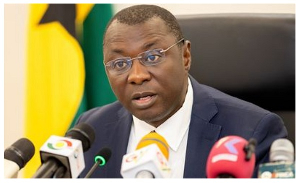Business News of Monday, 19 August 2024
Source: thebftonline.com
The suspended 15 percent value-added tax (VAT) on electricity may be reintroduced as the inflation rate continues to decline.
Last week, the Ghana Statistical Service (GSS) reported that annual inflation had slowed to a 28-month low of 20.9 percent in July – the slowest pace since March 2022 – compared to 22.8 percent June this year.
In its July 2024 Country Staff Report, the International Monetary Fund (IMF) noted the willingness of local officials to reinstate the tax once inflation eases.
“On the revenue side, implementation of VAT on residential electricity (expected yield 0.17 percent of GDP) was suspended due to strong social resistance. The authorities are committed to implementing this measure when the inflation dynamics are more conducive,” the IMF said on page 10 of the report.
The VAT on residential electricity was initially announced as part of revenue-generating measures under the IMF-supported COVID-19 recovery efforts.
A letter from the Ministry of Finance, signed by former minister Ken Ofori-Atta and dated January 1, 2024, directed the Electricity Company of Ghana (ECG) and Northern Electricity Distribution Company (NEDCo) to implement the VAT for residential customers above a specified consumption level.
However, following intense public outcry led by organised labour government suspended the controversial tax in early February 2024 to allow for further engagement with stakeholders. The suspension came after the Trades Union Congress (TUC) and general public voiced strong opposition to the measure.
To plug the expected GH¢1.8billion revenue gap caused by the decision to halt electricity VAT, government among other things announced it’s plans to tax the foreign incomes of resident Ghanaians.
During an economic update in April 2024, Finance Minister Dr. Mohammed Amin Adam said government had to look for alternative revenue measures after abandoning the VAT on electricity.
“And so we had to look at alternative measures to generate more revenue to fill in that gap,” Dr. Adam said. “As for those alternative measures, some were announced in the Budget Statement of 2023 and also 2024 but were not effectively implemented. And so, now, we are determined to effectively implement these measures to generate the desired revenue and fill the gap created as a result of suspending the VAT.”
At the time, Dr. Adam explained that government’s decision to suspend the VAT on electricity had consequences for the country’s fiscal framework – and the new tax on foreign incomes is an effort to avoid missing key fiscal targets under Ghana’s IMF programme.
“Now, what this means is that when we take a decision as a government which borders on our fiscal framework, there are consequences,” Dr. Adam said. “And the consequences could persist unless we are proactive enough to find ways to fill the gap and avoid those consequences. One of the consequences could be that you miss out on the fiscal target, and the IMF programme then suffers.”
 Kanawu Radio number 1 news portal
Kanawu Radio number 1 news portal

